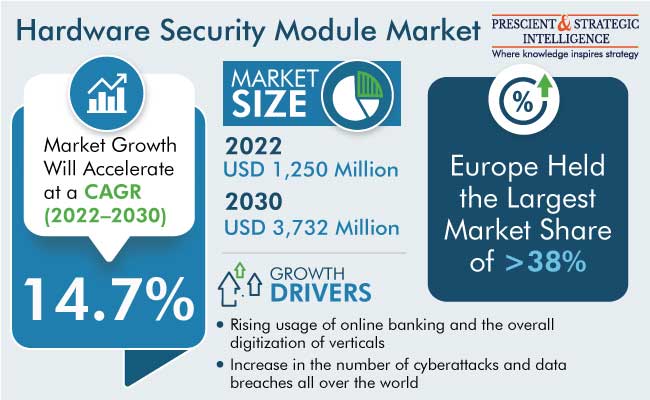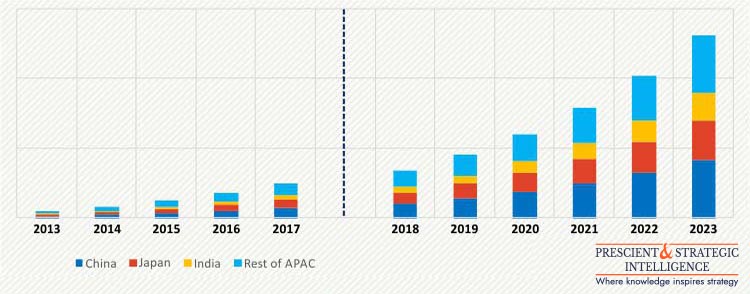Mobile VPN Market Growth To Be Fastest in Asia-Pacific (APAC)
The growth of the mobile virtual private network (MVPN) market is being driven by the increasing rate of cybercrime and rising demand for remote accessibility in large businesses. In 2017, revenue of $525.4 million was generated from the sales of the such solutions, which is predicted to witness a 19.7% CAGR during the forecast period (2018–2023), to surge to $1,560.7 million in 2023. A VPN uses the public internet to channel the traffic securely and secretly to a network from a computer or mobile phone.
On the basis of end user, the mobile VPN market is divided into government, telecommunication, financial, healthcare, utilities, military, oil and gas, mining, and others. During the historical period (2013–2017), the telecommunication division held the largest share, as with the increasing adoption of smartphones, these devices are being used to transfer business-critical information in organizations, which needs to be protected. Till 2023, the healthcare division will grow the fastest in the market due to the usage of these solutions for accessing confidential medical information by healthcare providers.
The key trend in the market presently is the adoption of VPNs for cybersecurity. With the increasing popularity of laptops, smartphones, and tablets, businesses are focusing on making their employees and information mobile, at the same time protecting the latter from unauthorized access. For this, MVPN continues to function even after mobile devices exit its coverage area or change networks. In addition, the processing power required and memory print created by MVPNs is smaller than wired VPNs, which allows the applications to run with more speed and the mobile battery to last longer.
One of the major drivers for the mobile VPN market is the increasing need for remote operations in large firms. With organizations having employees around the world, they require a centrally managed and simplified remote office, so that business application and database access can be provided to employees at low cost. Moreover, MVPNs offer remote employees flexibility, enhance productivity and user satisfaction, reduce help desk expenditure, and provide better support for issues that are common with VPNs.
Another major factor boosting the growth of the mobile VPN market is the increase in the number of cyberattacks. Because of this, $655 billion was estimated to be spent on cybersecurity solutions between 2015 and 2020, of which $113 billion was estimated to be specifically for securing mobile devices. As organizations grow, they generate increasing amounts of sensitive data, which makes them a potential target for cybercriminals. With a lot of this data now being stored on and exchanged via mobile devices, the demand for MVPNs is rising.
In 2017, the mobile VPN market generated the highest revenue in North America, because of the high incidence of cyberattacks, rapid sales of mobile phones, increasing implementation of the bring-your-own-device (BYOD) policy, heavy public and private spending on cybersecurity, and technological advancements. The fastest growth during the forecast period will be witnessed by Asia-Pacific (APAC), as a result of the rising sales of smartphones in India and China. Moreover, the increasing penetration of the internet, strict regulations regarding cybersecurity, and rapid industrializing are driving the demand for MVPN solutions in APAC.
Hence, the market will witness continuous growth around the world as more smartphones are bought and cybersecurity threats increase.
Read More:
https://www.psmarketresearch.com/market-analysis/mobile-virtual-private-network-products-marketMobile VPN Market Growth To Be Fastest in Asia-Pacific (APAC)
The growth of the mobile virtual private network (MVPN) market is being driven by the increasing rate of cybercrime and rising demand for remote accessibility in large businesses. In 2017, revenue of $525.4 million was generated from the sales of the such solutions, which is predicted to witness a 19.7% CAGR during the forecast period (2018–2023), to surge to $1,560.7 million in 2023. A VPN uses the public internet to channel the traffic securely and secretly to a network from a computer or mobile phone.
On the basis of end user, the mobile VPN market is divided into government, telecommunication, financial, healthcare, utilities, military, oil and gas, mining, and others. During the historical period (2013–2017), the telecommunication division held the largest share, as with the increasing adoption of smartphones, these devices are being used to transfer business-critical information in organizations, which needs to be protected. Till 2023, the healthcare division will grow the fastest in the market due to the usage of these solutions for accessing confidential medical information by healthcare providers.
The key trend in the market presently is the adoption of VPNs for cybersecurity. With the increasing popularity of laptops, smartphones, and tablets, businesses are focusing on making their employees and information mobile, at the same time protecting the latter from unauthorized access. For this, MVPN continues to function even after mobile devices exit its coverage area or change networks. In addition, the processing power required and memory print created by MVPNs is smaller than wired VPNs, which allows the applications to run with more speed and the mobile battery to last longer.
One of the major drivers for the mobile VPN market is the increasing need for remote operations in large firms. With organizations having employees around the world, they require a centrally managed and simplified remote office, so that business application and database access can be provided to employees at low cost. Moreover, MVPNs offer remote employees flexibility, enhance productivity and user satisfaction, reduce help desk expenditure, and provide better support for issues that are common with VPNs.
Another major factor boosting the growth of the mobile VPN market is the increase in the number of cyberattacks. Because of this, $655 billion was estimated to be spent on cybersecurity solutions between 2015 and 2020, of which $113 billion was estimated to be specifically for securing mobile devices. As organizations grow, they generate increasing amounts of sensitive data, which makes them a potential target for cybercriminals. With a lot of this data now being stored on and exchanged via mobile devices, the demand for MVPNs is rising.
In 2017, the mobile VPN market generated the highest revenue in North America, because of the high incidence of cyberattacks, rapid sales of mobile phones, increasing implementation of the bring-your-own-device (BYOD) policy, heavy public and private spending on cybersecurity, and technological advancements. The fastest growth during the forecast period will be witnessed by Asia-Pacific (APAC), as a result of the rising sales of smartphones in India and China. Moreover, the increasing penetration of the internet, strict regulations regarding cybersecurity, and rapid industrializing are driving the demand for MVPN solutions in APAC.
Hence, the market will witness continuous growth around the world as more smartphones are bought and cybersecurity threats increase.
Read More: https://www.psmarketresearch.com/market-analysis/mobile-virtual-private-network-products-market
·10KB Visualizações
·0 Anterior



